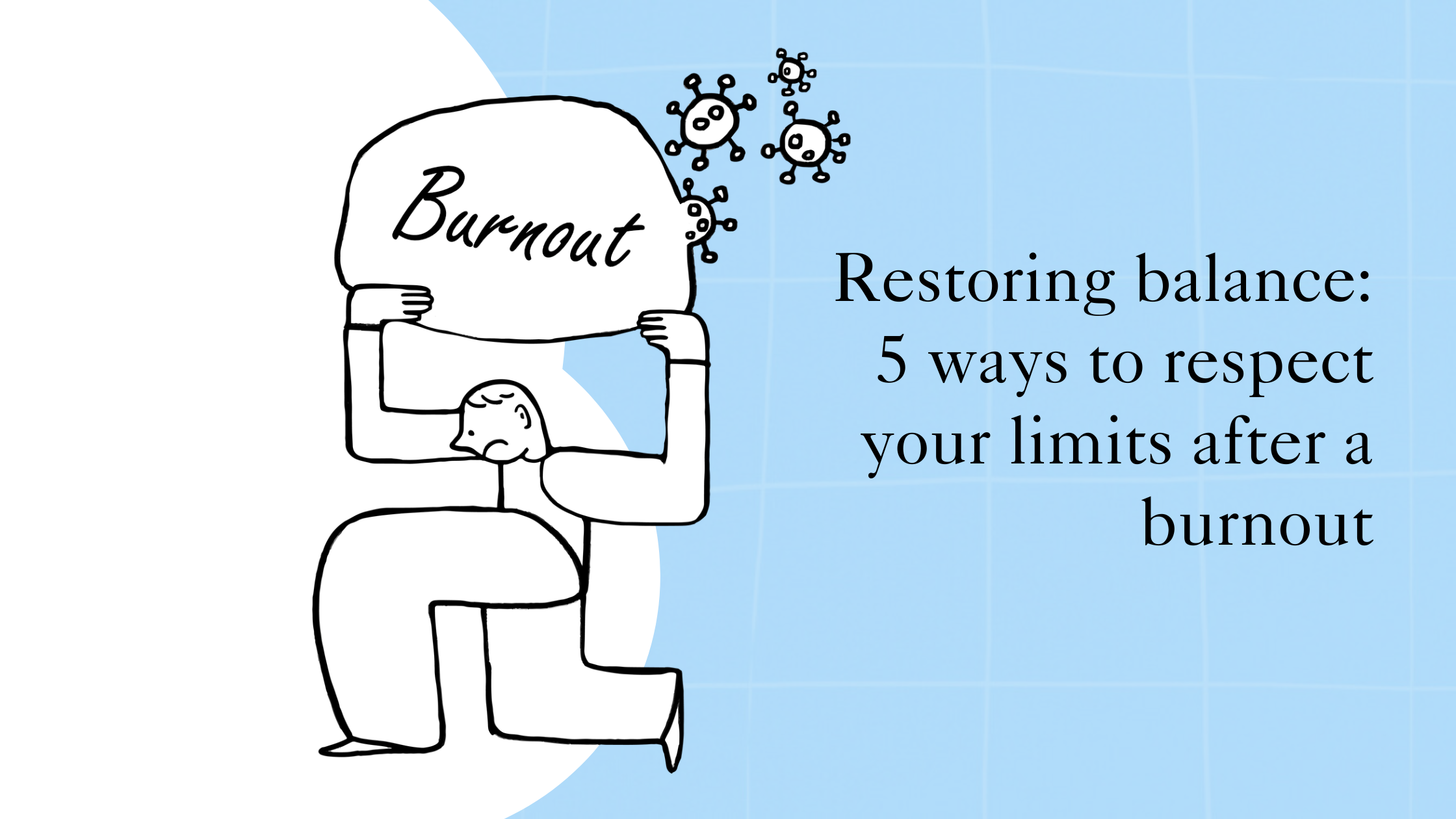“The greatest secret to happiness is to feel good about yourself." - Bernard Fontenelle
I've struggled with severe anxiety since childhood, and the work environment only exacerbated this in 2017, culminating in total burn-out. I was reduced to an empty shell. If I hadn't had the support of those close to me, it's possible I wouldn't be here talking to you about it.
This event completely changed my life and my perception of work. I realized that there was a serious lack of humanity and very little support for those suffering from mental disorders. From now on, my aim is to fight for well-being and professional balance, not only for myself, but also for others.
Burnout is a profoundly exhausting experience that can affect anyone, and it can be an important moment of reflection to reassess our priorities and learn to respect our limits. In this context, it's essential to recognize the importance of mental well-being at work. This article offers useful advice for those seeking to navigate the aftermath of burnout and institute positive changes in their working lives.
1. Practicing self-compassion
One of the first steps to respecting your limits after burnout is to practice self-compassion. As explained by Kristin Neff, specialist in the psychology of compassion, « Self-compassion means treating ourselves with the same kindness, care and understanding that we offer a good friend. » It's important to remember that burnout is not a sign of weakness, but a natural response to excessive pressure.
2. Open communication
Communication is the key to creating a work environment that is more conducive to mental health. Employers, colleagues and support teams need to be aware of each other's needs and limitations. Open dialogue about mental health can help eliminate stigma and encourage mutual support.

3. Time management
The time management is crucial to avoiding burnout. Creating a realistic schedule that includes periods of concentrated work, regular breaks and time for personal passions is an important step in maintaining a healthy work-life balance. It's just as important to manage where we invest our time outside work, so we don't feel overwhelmed all the time.
Socialization schedule
Having a ” socialization schedule ” means intentionally planning times in your schedule to interact socially with other people. This can include activities such as going out with friends, attending social events, arranging face-to-face or online meetings, or simply spending quality time with your family and loved ones. The main aim of this schedule is to ensure that you maintain meaningful social connections in your life, which is essential for emotional and mental well-being.
It is important to stress that the establishment of a " socialization schedule ” is not only beneficial to ensure sufficient social interactions, but also to avoid overextending into the social sphere, which is very easy to do in the age of hyperconnectivity.
Sometimes it is easy to engage in too many social activities, which can lead to exhaustion and lack of time for other aspects of your life. Having a set schedule allows you to find a healthy balance between social and other personal or professional commitments, ensuring that you take care of your mental well-being in a balanced way.
personal tasks
It is important to note that the same logic applies to personal tasks. Similarly, it is important to plan and allocate your personal tasks. Just as too much social interaction can lead to burnout, too many personal tasks can overload your schedule and create stress. By integrating this into your schedule, you can effectively manage your domestic responsibilities, leisure time, and time spent taking care of yourself. This ensures a healthy balance between the social, personal and professional aspects of your life, contributing to your overall well-being.
How to determine your own schedule?
Here is a concrete example to show you how:
First, identify your needs and limitations (as an example).
- You emphasize the importance of having non-socializing moments during the week to preserve your energy and well-being.
- You set a 1-hour time limit for conversations and messages, which allows you to manage your time effectively.
- You plan social activities only during your " opening hours ” between 11:00 and 19:00 from Monday to Saturday, which gives you a well-deserved rest time outside of these hours.
- You should take at least two nights off per week or one evening and Saturday to maintain a healthy balance.
- You ask for help with some household chores, recognizing that support is essential to your well-being.
- Clearly inform people that you will not be available outside of your " opening hours", which strengthens your ability to manage time effectively and respect your limits.
MONDAY, TUESDAY, WEDNESDAY, THURSDAY:
- You start your day by taking time for yourself, avoiding answering messages and the phone before 11:00 am, except in case of emergency.
- You spend time on physical exercise and housekeeping, which contributes to your personal well-being.
- Your working time is between 11am and 7pm, creating a dedicated time slot for productivity.
- After 7 pm, you declare a full break, giving yourself time to relax.
- You do dishes to keep the environment clean.
FRIDAY:
- You maintain your morning routine, including exercise and cleaning.
- You have a team building activity, which promotes socialization with your colleagues.
- After 7 pm, you take time to relax and rest, like the other days.
SATURDAY:
- You start the day in a similar way, doing your personal tasks before 11:00.
- You take a shower to cool off.
- After 7 pm, you will enjoy a time of rest and relaxation again.
SUNDAY:
- You maintain the morning routine by avoiding messages and phone calls before 11am.
- You leave this day completely free of planning, offering you a full day of rest.
- After 7 pm, you continue to relax and rest.
This example of a schedule is an excellent way to maintain a balance between your social, professional and personal life while respecting your personal needs and limits. It can be an inspiration for those who are looking to establish a similar structure in their own lives.
4. Burnout prevention
Prevention is as important as healing. Adopt mental wellness practices at work, such as mindfulness, the stress management and better plan his time at work and outside it.
Push for a corporate culture that values mental health and provides resources to support it.
5. The continuous development
Learning and continuous development are essential to develop in a changing world. Knowledge about mental health is changing rapidly, and it’s important to stay up-to-date on the latest developments to better understand, support and develop your mental health at work.
Respecting one’s limits after a burnout is an important personal and professional process. It is important to transform workplaces to be more compassionate towards those with mental health issues. Every small step toward respecting personal boundaries can contribute to greater inner peace and the creation of healthier, more respectful work environments.
The ultimate goal is to create professional spaces where mental wellness is a priority, compassion is encouraged, and no one is left alone in their struggles. Together, we can help make these ideals a reality.
We encourage you to try out these tips and share your results with us in the comments below. If you have any questions, please contact us here or visit our Q&A.

